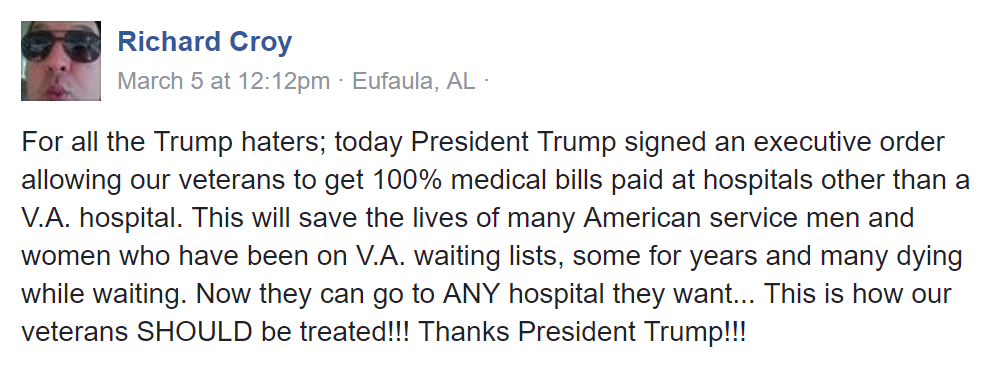Rumor has it that veterans’ health care is now 100 percent covered at any hospital, anywhere. All they have to do is present their Veterans Affairs card. Unfortunately, this isn’t the case.
With roughly 22.6 million veterans in our country, it’s become a pretty big misconception for agents and clients trying to navigate their health coverage. So, we’ll try and clear things up.
Listen to this article:
What Happened?
Last month, a Facebook user posted that President Donald Trump signed an executive order allowing all vets to receive free health care in any facility with their VA card. It was shared more than 310,000 times and reads as follows:

What’s Wrong with That?
Not everything about this claim is false, but most of it is. And it’s been confusing for agents and clients alike.
While Trump didn’t sign an executive order allowing vets to seek treatment wherever they want, he did extend the Veteran’s Choice Act that Barack Obama enacted in 2014, which worked to provide a wider scope of care to veterans. One relevant part of the act states that “Veterans who are unable to schedule an appointment within 30 days of their preferred date or the clinically appropriate date, or on the basis of their place of residence to elect to receive care from eligible non-VA health care entities or providers.”
What the act doesn’t do is give vets free health care at any facility. However, the wider scope of provider options that was put into action in 2014 is still true today, and, following Trump’s extension, will be through the end of 2019.
What Should My Clients Do with This Info?
So glad you asked! Pairing VA benefits with Medicare is a flexible way to help cover your clients’ health care needs.
Basically, VA benefits are distributed to those who were on active duty and released for reasons other than dishonorable discharge, providing things like life insurance, health care, education, and pension. However, it does not cover all health care costs. When vets over 65 pair their health benefits with Medicare, they have more flexibility and options in where they receive care and how it’s paid for.
How Does Medicare Work with VA Benefits?
There’s a good chance your veteran prospects and clients have questions about whether paying for Medicare benefits really makes sense for them. We have answers.
Q: When should my client enroll in Medicare, and what are the benefits?
A: By enrolling in Medicare when they’re eligible, your clients can get so much more from their health care, and can receive care at more facilities. But it’s imperative that they enroll as soon as they’re able to in order to avoid any penalties. They can get Part A, which covers hospitalization, and Part B, for doctor visits and outpatient services.
The nice thing about being a vet with Medicare? They don’t need to enroll in Part D (prescription drug coverage), because their VA benefits already cover them in that area. However, having that added protection of a Part D plan will provide them with the ability to use a local pharmacy and may provide additional savings on certain prescriptions.
Q: Which providers can my veteran client with Medicare go to?
A: They can use their Medicare benefits when seeing any civilian provider that accepts Medicare. Beneficiaries can use Medicare.gov to find physicians and other clinicians who accept Medicare.
Additionally, all enrolled veterans can use their VA benefits for health care received at any VA facility nationwide. Veterans can find nearby facilities using this locator at VA.gov. In order to apply VA benefits to services, your client must go to a VA facility or have the VA authorize services in a non-VA facility. Similarly, Medicare won’t pay for any care you receive at a VA facility.
Q: Can my client also have a Medicare Advantage plan? What about Medicare Supplements?
A: Yes, your client can have a Medicare Advantage or Medicare Supplement plan in addition to their VA benefit/Medicare combination. It’s strongly suggested, however, that they have Medicare Parts A and B at the very least.
Something to consider: Medicare Supplements can be harder to obtain or more expensive the longer a client waits past their initial enrollment period. If their VA benefits are reduced down the road, they may regret not purchasing a Medicare Supplement when first eligible.
No, unfortunately vets can’t walk into any facility and be 100 percent covered – not many people can. But by pairing VA Benefits with Medicare, they have significantly more options and coverage than if they didn’t.





Share Post